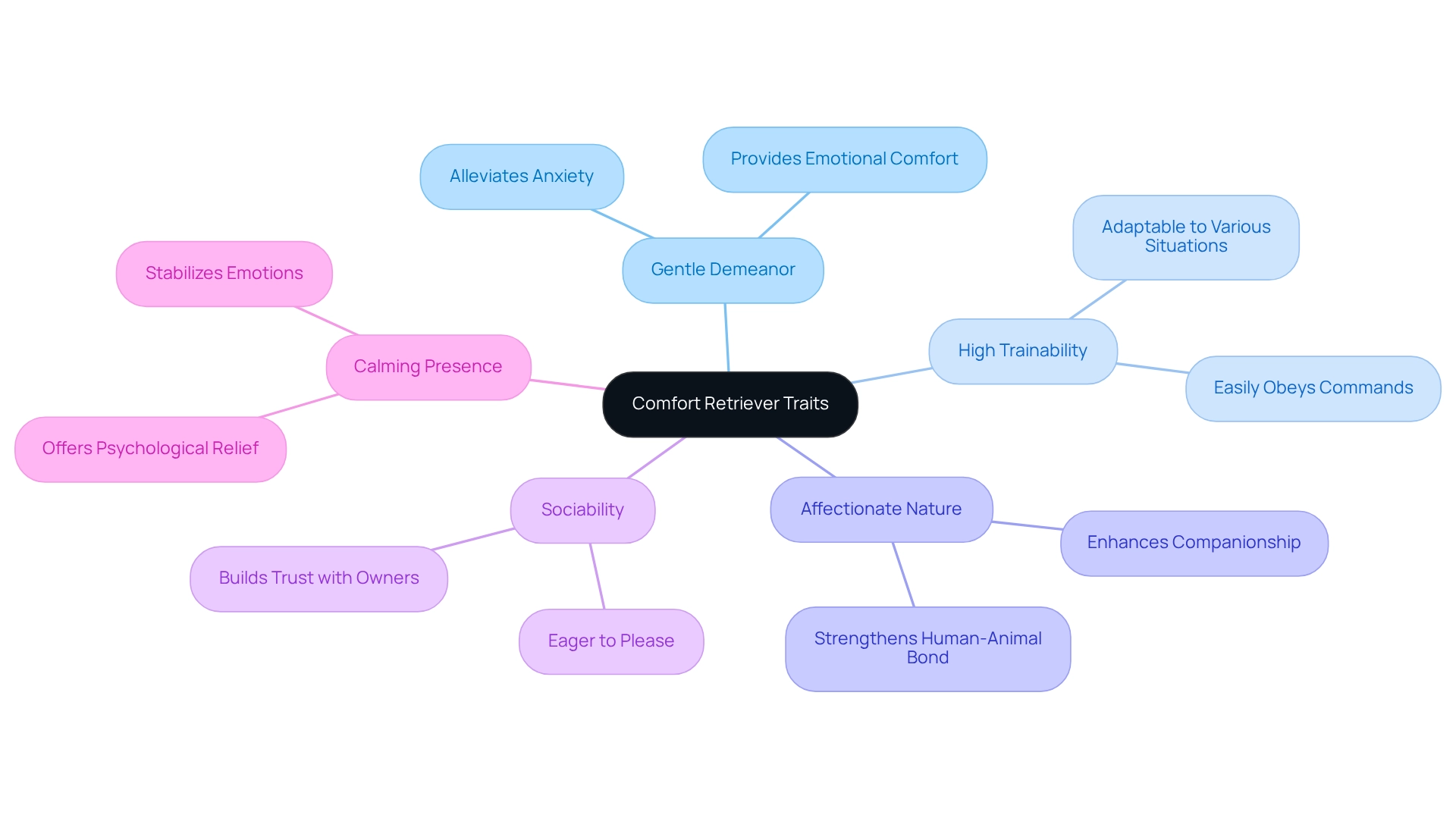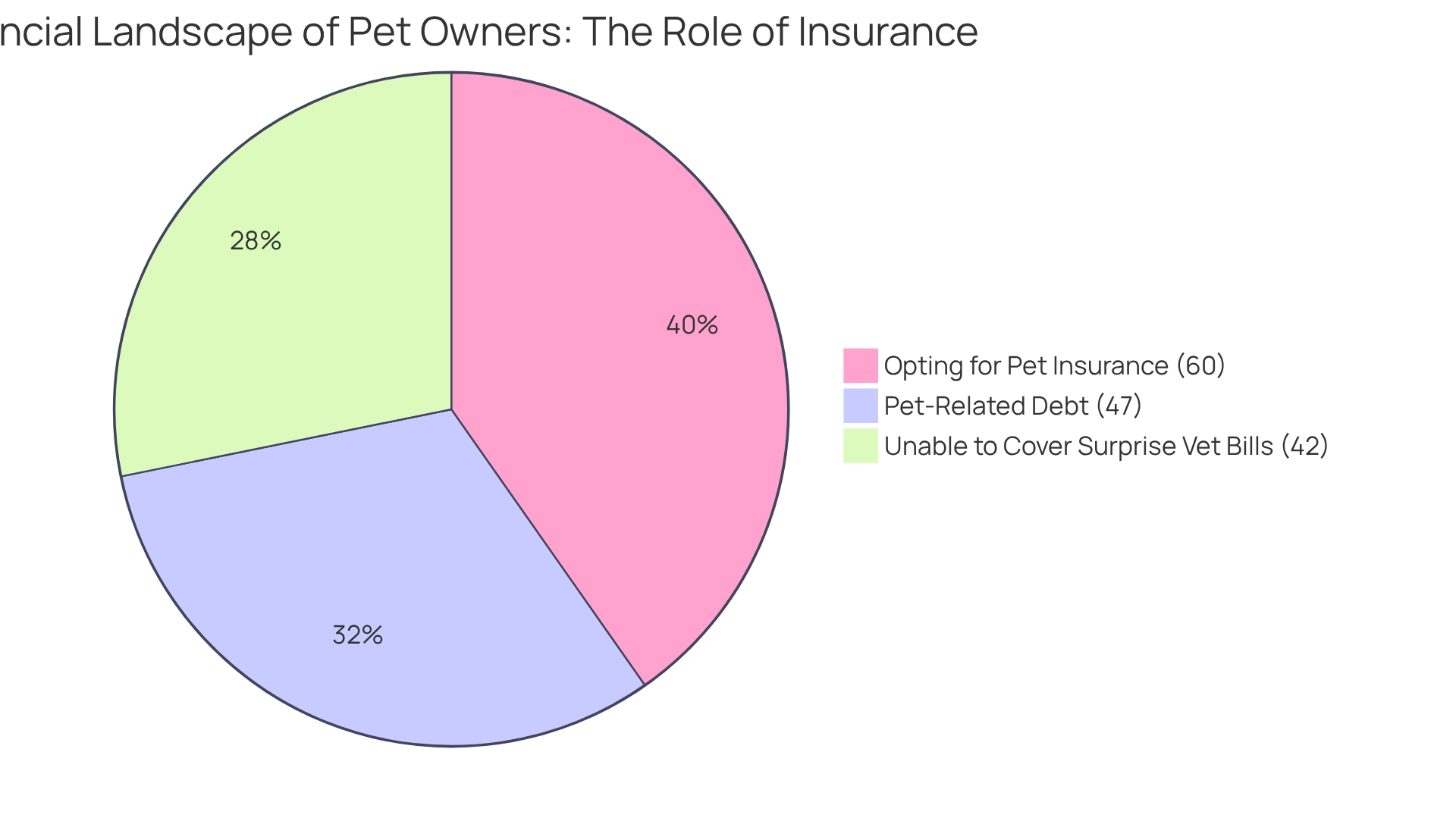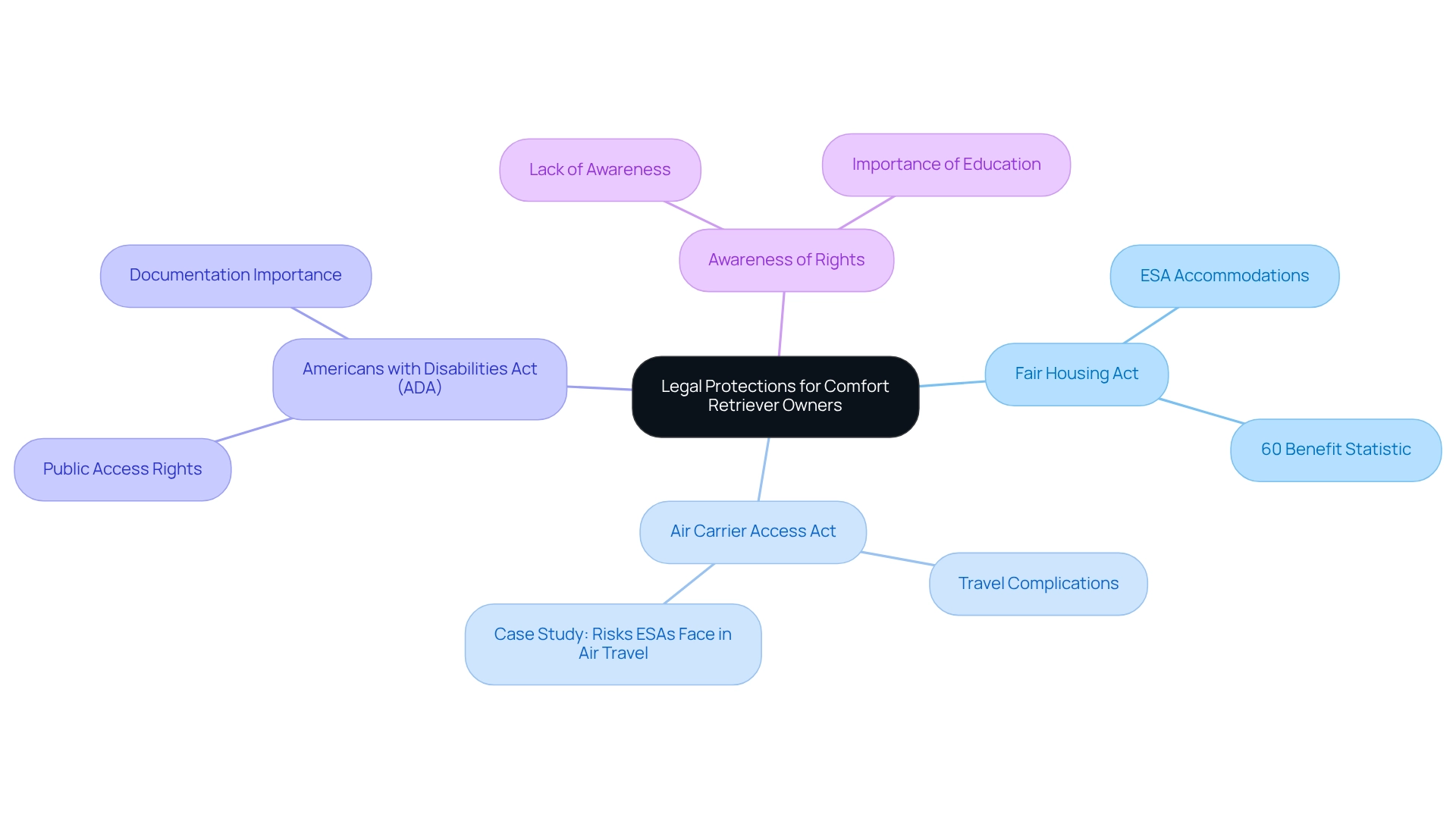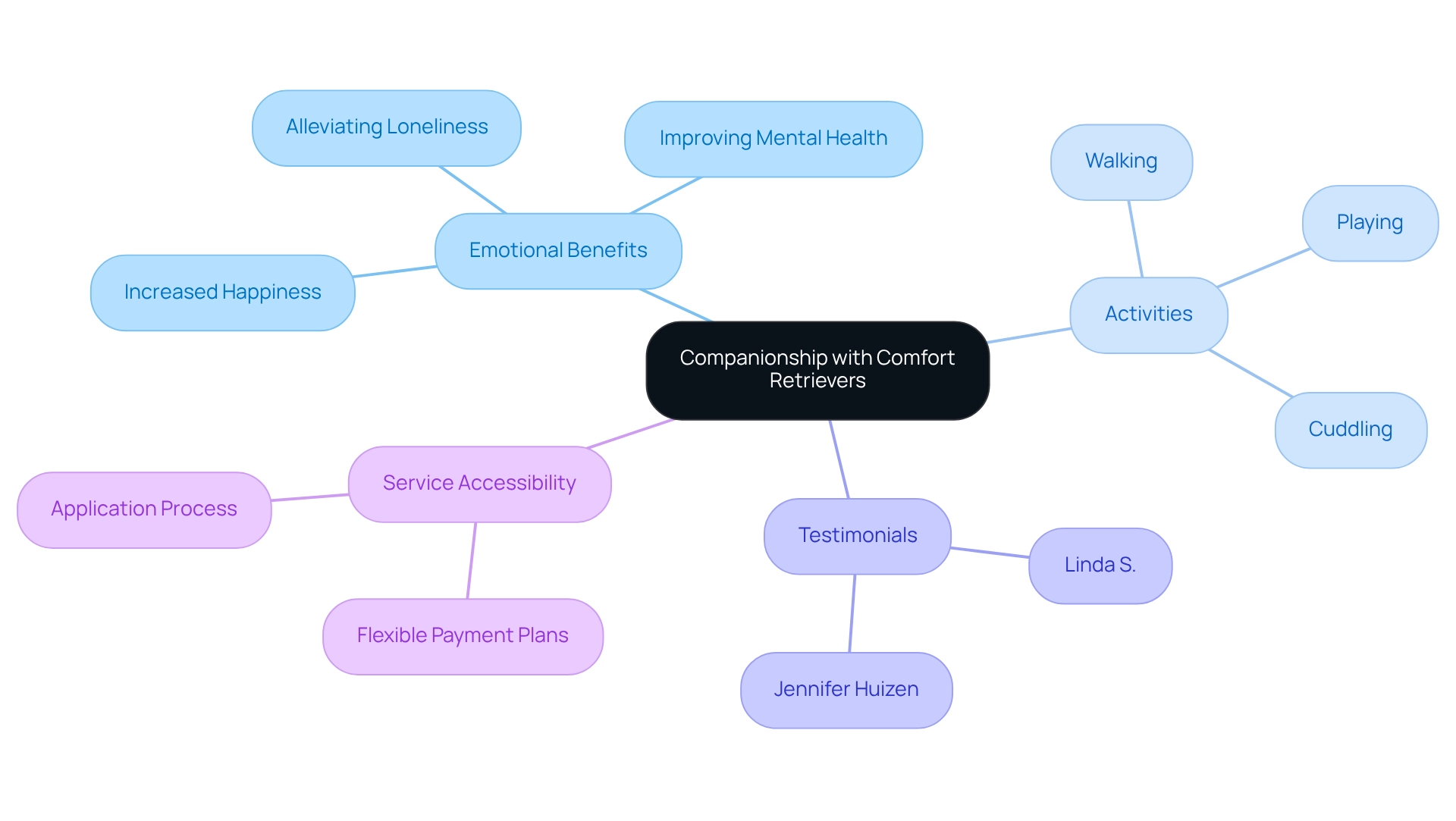

7 Benefits of a Comfort Retriever for Emotional Support
by Lena Park
Last updated: July 6, 2025
Verified and Approved by:
Angela Morris,
MSW, LCSW
Fact Checked

Overview
The article highlights the profound benefits of comfort retrievers, particularly their invaluable role as emotional support animals and their positive influence on mental health. It recognizes the emotional struggles many individuals face, such as anxiety and depression, and emphasizes how comfort retrievers, like Golden Retrievers, offer companionship that can significantly alleviate these feelings. Research supports this, indicating that owners experience notable improvements in their emotional well-being. By providing unconditional love and support, these remarkable animals serve as a beacon of hope for those seeking comfort and connection.
Introduction
In a world where mental health challenges are increasingly acknowledged, many individuals find themselves grappling with feelings of anxiety, depression, and loneliness. These emotional struggles can often feel overwhelming, leaving one to wonder where to turn for support. This is where comfort retrievers step in as invaluable emotional support animals, providing not just companionship but also a calming presence that can make a significant difference in one’s life.
Imagine the warmth of a loyal companion by your side, someone who understands your feelings without the need for words. Comfort retrievers offer profound benefits, helping to alleviate the weight of mental health challenges. With services like Wellness Wag simplifying the process of obtaining Emotional Support Animal letters, individuals can access the support they need without unnecessary hurdles, allowing them to focus on their journey to emotional well-being.
As the bond between humans and their furry friends deepens, it becomes essential to understand the legal protections and training requirements for comfort retrievers. This knowledge not only enhances the emotional support they provide but also enriches the overall quality of life for those who rely on them. Remember, you are not alone in this journey, and the support of an emotional support animal can be a transformative step towards healing and happiness.
Wellness Wag: Fast and Reliable ESA Letter Services
Navigating the complexities of mental health can be a daunting journey, often leaving individuals feeling isolated and overwhelmed. For many, a comfort retriever can provide the emotional support that makes all the difference, offering companionship during challenging times. However, obtaining the necessary documentation for an Emotional Support Animal (ESA) can feel like an additional hurdle. This is where Wellness Wag steps in, offering a streamlined and compassionate process for obtaining valid ESA letters, ensuring that clients receive the support they need promptly.
The process begins with a quick assessment to determine eligibility, followed by consultations with licensed medical professionals who specialize in mental health. This thoughtful approach acknowledges the unique struggles faced by each individual, allowing for a personalized experience. Once an order is placed, clients receive a confirmation email detailing their purchase, providing reassurance as they await their ESA letter. Upon approval, clients can expect to receive their official letter within 24 hours, facilitating access to housing and travel accommodations that might otherwise limit pet ownership.
This swift turnaround is crucial for those grappling with mental health challenges, as it enables them to secure the immediate support they need from their comfort retriever. Notably, 47% of clients receiving ESA letters are male, showcasing the diverse demographic that benefits from these services. With a significant percentage of clients receiving their letters within this timeframe, Wellness Wag stands out as a trusted partner in navigating the complexities of ESA documentation.
Clients can anticipate a seamless experience, as highlighted by testimonials like that of Linda S., who shared, “Applying for an ESA through Wellness Wag was the best decision I made. It was an effortless process and the team was very professional.” This underscores the importance of choosing specialized services like Wellness Wag, which can expedite the process significantly compared to general practitioners. Ultimately, this compassionate support enhances the well-being of those in need, reminding us that no one has to face their struggles alone.
Comfort Retriever: Ideal Traits for Emotional Support
Golden Retrievers, known as comfort retrievers, are particularly renowned for their exceptional qualities as support animals. Their gentle demeanor, high trainability, and affectionate nature make them the perfect comfort retriever for those seeking solace. Golden Retrievers possess a natural sociability and an eagerness to please, fostering a deep bond with their owners. Their calming presence can significantly alleviate feelings of anxiety and loneliness, providing stability for individuals navigating mental health challenges.
Many individuals face emotional struggles that can feel overwhelming. Statistics reveal that Golden Retrievers, known as comfort retrievers, are among the most favored breeds for support because of their innate ability to connect deeply with humans. Their traits, such as loyalty and patience, enhance their effectiveness in providing companionship. Case studies highlight the positive influence of Golden Retrievers on those with conditions like PTSD, where their calm demeanor and unwavering loyalty offer significant psychological relief. As Jonalyn Dionio observes, “The data indicates an increasing dependence on ESAs and assistance animals, emphasizing their essential role in mental health care and public well-being.”
The profound advantages of having a comfort retriever, such as a Golden Retriever, as a support animal are significant. Imagine the comfort of having a loyal friend by your side during difficult times. These remarkable animals not only provide companionship but also contribute to a sense of security and emotional well-being. For those in need of therapeutic companionship, Golden Retrievers truly stand out as a compassionate solution, reminding us that support is always within reach.

Therapy Dogs: Comfort Retrievers in Action
Recognized for their therapeutic qualities, comfort retrievers serve as invaluable therapy animals in various environments, including hospitals, schools, and mental health facilities. Their presence significantly alleviates stress and anxiety among patients and students, offering a source of comfort during challenging times. For instance, during examination periods, therapy animals are often welcomed into schools, providing essential support that helps students navigate the pressures of testing. The nonjudgmental companionship and unconditional affection these animals offer foster a calming atmosphere, enhancing emotional well-being.
Research highlights that therapy canines can lead to a measurable reduction in anxiety levels. Studies reveal that students who interact with comfort retrievers report experiencing less stress during high-pressure situations. A review of ten articles underscores the effectiveness of therapy animals in alleviating stress and anxiety. Additionally, case studies illustrate the positive impact of therapy animals in hospitals, where they contribute to increased patient satisfaction and psychological recovery.
As schools increasingly consider establishing therapy dog programs, recent studies aim to guide these initiatives, showcasing the significance of these animals in promoting mental health and psychological resilience. Community input on how to successfully introduce therapy animals is vital for their effective integration into school environments. While service animals must undergo specific training and are protected under the Americans with Disabilities Act (ADA), therapy animals, including comfort companions, provide emotional support without the same legal certification requirements. However, obtaining certification can enhance their credibility and ensure they meet certain standards, further bolstering their role in therapeutic settings.
Pet Insurance: Financial Security for Comfort Retriever Owners
Pet insurance is a vital resource for owners of comfort retrievers, providing essential financial protection against unexpected veterinary expenses. In 2025, the average cost of pet insurance for dogs ranges from approximately $50 to $100 per month, influenced by the coverage level and the dog’s age and health. Many plans offer comprehensive coverage that includes routine check-ups, vaccinations, and emergency care. This investment not only safeguards against significant vet bills—averaging between $800 and $1500 for emergencies—but also alleviates the stress associated with potential medical costs.
Statistics reveal that:
- 47% of pet parents have faced pet-related debt
- 42% cannot cover surprise vet bills
This underscores the importance of insurance as a worthwhile investment for those who might struggle with unexpected expenses. This enables them to prioritize their comfort animals’ health without financial strain. Moreover, many pet insurance plans now include options for preventive care, making routine visits more affordable. This is especially beneficial for comfort retrievers, as regular veterinary care is crucial for sustaining their well-being. More than 60% of pet guardians have chosen insurance, acknowledging its worth in delivering peace of mind.
For comfort dog caretakers, having pet insurance allows them to focus on the emotional support their animals provide, rather than worrying about the financial implications of veterinary care. Case studies highlight that those who invest in pet insurance often report a greater sense of security, knowing their furry companions will receive necessary medical attention when needed. The case study titled ‘Evaluating Pet Insurance Value‘ emphasizes that insurance is likely a worthwhile investment for those who would struggle with unexpected costs, while others may prefer to save or self-insure based on their financial comfort.
Additionally, as noted by Kudos, if your pet is already 10+ years old and not previously insured, many companies either won’t start a new policy or will charge significantly more, making early investment in insurance crucial. Ultimately, pet insurance serves as an essential resource for ensuring the well-being and joy of comfort retrievers, thereby strengthening the bond between caregiver and pet. With flexible payment plans starting as low as $32.25, pet insurance becomes an accessible option for many working professionals.

Mental Health Benefits: Comfort Retrievers as Emotional Support
Comfort retrievers, including breeds like Golden Retrievers and Corgis, offer profound mental health benefits to their owners. Many individuals struggle with the weight of anxiety and depression, and research shows that interacting with dogs can significantly lower stress levels. In fact, studies indicate that petting a dog can reduce cortisol, a stress hormone, by up to 30%. This simple yet powerful interaction not only alleviates anxiety but also helps mitigate symptoms of depression, fostering a sense of security and belonging for those facing mental health challenges.
The companionship of a comfort dog enhances mental resilience. Their unconditional love and loyalty provide invaluable support during challenging times. Moreover, studies have demonstrated that dog ownership is associated with lower levels of anxiety and depression, particularly among university students. However, it’s essential to acknowledge that further research is needed on the effects of pet ownership on anxiety and depression, as existing studies have shown mixed findings. As more people recognize the therapeutic potential of these breeds, comfort retrievers are becoming vital companions in the quest for enhanced mental well-being. With the new no-fly policy for Emotional Support Animals (ESAs) that started on January 11, 2021, having proper documentation for ESAs has become increasingly relevant. For those contemplating the advantages of a comfort animal, consulting with a licensed expert for an ESA letter through Wellness Wag’s streamlined telehealth services can be a valuable step in accessing the support they require.
Understanding the differences between Emotional Support Animals (ESAs) and service dogs is also important, as they possess distinct legal rights and access privileges. If you have questions or concerns about this Privacy Policy, please feel free to reach out by sending an email to [email protected].
Legal Protections: Rights of Comfort Retriever Owners
For caregivers of comfort retrievers, it is essential to have strong legal safeguards that provide a sense of security under various laws, particularly the Fair Housing Act and the Air Carrier Access Act. These regulations are designed to ensure that individuals with emotional support animals (ESAs) can live in pet-restricted housing and travel with their beloved companions without facing discrimination. The Fair Housing Act, for instance, mandates that housing providers accommodate animals that assist individuals with disabilities, thereby protecting the rights of those who possess ESAs. Recent statistics reveal that around 60% of ESA possessors benefit from this act, underscoring its vital role in enhancing accessibility for those who need it most.
Moreover, the Air Carrier Access Act has played a crucial role in allowing comfort animals to accompany their handlers on flights. However, recent changes have complicated this process. ESAs are increasingly being treated like regular pets, resulting in a rise in incidents involving animals during transport. This situation highlights the urgent need for better protections for ESAs, as safety records can vary significantly between airlines. A case study titled ‘Risks ESAs Face in Air Travel’ sheds light on these challenges, emphasizing the importance of enhanced regulations to safeguard ESA holders during their journeys. Understanding the legal rights of assistance animals under the Americans with Disabilities Act (ADA) is equally vital for caregivers of comfort retrievers. While service animals are not required to be certified or registered, obtaining documentation from recognized organizations can bolster credibility and ensure that the animal meets specific training standards. This legal framework grants service dog handlers full public access rights, enabling them to bring their dogs into various public spaces, including restaurants and stores, and ensuring housing accommodations even in pet-restricted areas.
Despite these protections, awareness of ESA rights among pet guardians remains a critical issue. Many individuals are still unaware of their legal entitlements, which can hinder their ability to advocate for necessary accommodations. Expert opinions emphasize the importance of informing ESA guardians about their rights under the Fair Housing Act and the Air Carrier Access Act, ensuring they can successfully navigate housing and travel challenges. As the demand for comfort retrievers continues to rise—evidenced by a 20% yearly increase in Australia—understanding these legal frameworks becomes increasingly essential for handlers seeking psychological support.

Training Requirements: Preparing Comfort Retrievers for Support Roles
Training is vital for equipping comfort retrievers to perform their duties as emotional support animals. These animals provide comfort to individuals, particularly students with disabilities, by alleviating symptoms related to their conditions. A solid foundation in basic obedience training is essential, as it fosters good behavior and responsiveness. Moreover, socialization plays a crucial role, exposing the dog to diverse environments and people to ensure they remain calm and friendly in various situations.
Effective training programs often utilize positive reinforcement methods, which not only promote desired behaviors but also enhance the training experience for both the dog and the handler. Have you ever considered how an Emotional Support Animal could transform your life? Statistics indicate that approximately 18% of pet guardians in the U.S. now have ESAs, reflecting a societal shift towards integrating these animals into mental health care and promoting equal opportunities for students to enjoy residential life.
Well-trained assistance dogs significantly improve the quality of life for their handlers. Numerous programs report high success rates in training results, showcasing the positive impact these animals can have. As noted by UCLA Health, animal therapy has reportedly been shown to reduce the need for pain medication by 28% following certain surgical procedures. This underscores the importance of effective training. By prioritizing obedience and socialization, a comfort retriever can effectively offer the support their guardians require, facilitating access to housing and enhancing overall well-being. As Roger Caras aptly stated, ‘Dogs are not our whole life, but they make our lives whole.’ This highlights the profound impact these animals have on our well-being, reminding us that the love and companionship they provide can be a source of great comfort.
Companionship: Enhancing Life with a Comfort Retriever
The companionship of a comfort dog can profoundly enhance the quality of life for their guardians. Many individuals face emotional challenges such as loneliness and isolation, which can be overwhelming. Fortunately, the services provided by Wellness Wag offer a compassionate solution. These dogs deliver invaluable psychological support, effectively alleviating feelings of sadness and disconnection. Research shows that pet ownership can significantly improve mental health outcomes; individuals with pets often report lower levels of anxiety and depression. The bond formed between a caregiver and a comfort retriever fosters increased happiness and a renewed sense of purpose.
Engaging in activities like walking, playing, or simply cuddling not only strengthens this connection but also supports the psychological health of both the caregiver and the dog. As Jennifer Huizen observes, “The sentimental bond between pets and their owners can be a powerful source of comfort and joy.” Clients like Linda S. have shared their experiences, stating, “Applying for an ESA through Wellness Wag was the best decision I made. It was an effortless process and the team was very professional.” This highlights the exceptional service and quick approval process that Wellness Wag offers for Emotional Support Animal letters, making it easier for individuals to access the emotional support of their pets.
Moreover, Wellness Wag’s flexible payment plans, starting as low as $32.25, help to overcome financial barriers. This accessibility is essential, especially as pet adoption is increasingly promoted as a way to address loneliness and social isolation. The role of comfort retrievers in enhancing quality of life is becoming increasingly evident, reminding us that support is available for those who need it most.

Adaptability: Comfort Retrievers in Pet-Restricted Housing
Comfort dogs, particularly Golden Retrievers and Corgis, are cherished for their remarkable adaptability, making them ideal companions for those navigating the challenges of pet-restricted housing. With a valid Emotional Support Animal (ESA) letter, individuals can find solace in knowing they can legally keep their comfort dogs in places that typically prohibit pets. This legal protection is crucial, especially when we consider that around 60% of individuals with mental health issues reside in such environments.
Research has shown that support animals, particularly comfort retrievers, can significantly alleviate symptoms of anxiety, depression, and PTSD, fostering psychological resilience and enhancing daily functioning. Real-life stories highlight how ESA letters have empowered individuals to maintain their support systems despite housing restrictions. For example, many clients have successfully advocated for their rights under the Fair Housing Act, which states that landlords can only deny ESA requests if accommodating the animal would create an undue financial or administrative burden.
As we look ahead to 2025, the significance of securing legitimate ESA letters through accessible services like those offered by Wellness Wag cannot be emphasized enough. This user-friendly process enables individuals to easily obtain the necessary documentation online. Misrepresentation of ESA letters can lead to serious repercussions, including eviction and denial of travel accommodations. Therefore, understanding the legal framework surrounding ESA letters is essential for individuals to safeguard their rights while nurturing a supportive environment for their comfort retriever.
It is equally important to recognize the distinctions between Emotional Support Animals and Service Dogs. While both provide valuable assistance, service dogs are specially trained to perform tasks for individuals with disabilities, whereas ESAs primarily offer companionship and emotional support. As noted by HABRI, pets bring psychological comfort and a sense of purpose and connection, underscoring their vital role in the lives of their caretakers.
For those contemplating the acquisition of an ESA letter, seeking legitimate services, such as those provided by Wellness Wag, is crucial to ensure compliance with legal standards and to protect your rights.
Overall Impact: Comfort Retrievers and Emotional Well-Being
The impact of comfort animals on emotional well-being is truly significant. These devoted companions provide unwavering support, greatly alleviating feelings of anxiety and depression, which enhances their guardians’ overall quality of life. The bond between a comfort dog and their owner nurtures better mental health outcomes and promotes social interactions. Many individuals face emotional challenges, and research shows that pet ownership can lead to positive mental health indicators, highlighting the vital role these animals play in therapeutic settings.
Responsible pet ownership is essential, highlighting the importance of emotional support animals such as comfort retrievers. Wellness Wag understands this need and offers flexible payment plans, starting as low as $32.25, making it easier for individuals to access these invaluable companions. Have you ever considered how much a comfort animal could improve your life? As shared by a satisfied client, Linda S., “Applying for an ESA through Wellness Wag was the best decision I made. It was an effortless process and the team was very professional.” This heartfelt testimonial illustrates the exceptional service and swift approval that Wellness Wag provides for Emotional Support Animal letters.
Available nationwide, Wellness Wag ensures that individuals across the U.S. can benefit from these essential services, fostering a sense of hope and support for those in need. Remember, you are not alone in this journey; compassionate help is available to guide you towards a brighter future.
Conclusion
The profound impact of comfort retrievers on mental health is truly significant. These loyal companions, especially breeds like Golden Retrievers, provide invaluable emotional support, helping to ease feelings of anxiety, depression, and loneliness. Have you ever felt overwhelmed by these emotions? Through services like Wellness Wag, individuals can easily obtain the necessary documentation to qualify for an Emotional Support Animal, ensuring access to this essential support without unnecessary barriers.
The legal protections under the Fair Housing Act and the Air Carrier Access Act further empower comfort retriever owners to integrate their pets into their lives, regardless of housing restrictions or travel challenges. Understanding these rights is crucial for individuals advocating for their needs, allowing them to fully enjoy the benefits of their emotional support animals.
Moreover, the importance of training cannot be overlooked. Properly trained comfort retrievers not only enhance their owners’ quality of life but also foster harmonious relationships in various settings. The companionship they provide nurtures emotional resilience and promotes overall well-being, making them indispensable allies on the journey toward mental health.
Ultimately, the bond between humans and their comfort retrievers is a testament to the healing power of animal companionship. As more individuals recognize the benefits of these relationships, the significance of accessing support through legitimate channels like Wellness Wag becomes increasingly clear. This paves the way for improved emotional health and a greater sense of belonging. Remember, you are not alone in this journey; support is available to help you thrive.
Frequently Asked Questions
What is the purpose of obtaining an Emotional Support Animal (ESA) letter?
An ESA letter provides individuals with the necessary documentation to access housing and travel accommodations that might otherwise limit pet ownership, offering emotional support through companionship during challenging times.
How does Wellness Wag facilitate the process of obtaining an ESA letter?
Wellness Wag offers a streamlined process that begins with a quick assessment to determine eligibility, followed by consultations with licensed medical professionals specializing in mental health. Clients receive their ESA letter within 24 hours upon approval.
What is the significance of the quick turnaround time for receiving an ESA letter?
The swift turnaround time is crucial for individuals grappling with mental health challenges, as it enables them to secure immediate support from their comfort retriever, helping alleviate feelings of isolation and overwhelm.
What demographic benefits from Wellness Wag’s ESA letter services?
Notably, 47% of clients receiving ESA letters are male, indicating a diverse demographic that benefits from these services.
What kind of experience can clients expect when applying for an ESA letter through Wellness Wag?
Clients can anticipate a seamless experience, highlighted by positive testimonials, indicating that the process is effortless and the team is professional.
Why are Golden Retrievers considered effective comfort retrievers?
Golden Retrievers are known for their gentle demeanor, high trainability, affectionate nature, loyalty, and patience, making them particularly effective in providing companionship and emotional support to individuals facing mental health challenges.
How do comfort retrievers, like Golden Retrievers, contribute to emotional well-being?
Comfort retrievers provide companionship that can significantly alleviate feelings of anxiety and loneliness, offering stability and support to individuals navigating emotional struggles.
In what environments are comfort retrievers recognized for their therapeutic qualities?
Comfort retrievers serve as therapy animals in various settings, including hospitals, schools, and mental health facilities, where they help alleviate stress and anxiety among patients and students.
What benefits do therapy animals provide in educational settings?
Therapy animals help reduce stress during high-pressure situations, such as exams, by fostering a calming atmosphere and providing nonjudgmental companionship and unconditional affection.
What is the difference between service animals and therapy animals?
Service animals undergo specific training and are protected under the Americans with Disabilities Act (ADA), while therapy animals, including comfort companions, provide emotional support without the same legal certification requirements, although certification can enhance their credibility.
Certify Your Emotional Support Animal Today

Why You Can Rely on Us?
At Wellness Wag, we believe your pet deserves care rooted in both science and compassion. Each article is carefully researched, written in clear language for pet owners, and then reviewed by qualified professionals to ensure the information is evidence-based, current, and practical for real-life care. Our goal is to help you feel confident in making informed decisions about your pet’s health and well-being.
Reviewed by
Angela Morris, MSW, LCSW
Angela is a licensed clinical social worker with 20 years of experience in patient advocacy and community mental health. She has assisted numerous clients with ESA evaluations and brings a deep understanding of disability accommodations, ensuring that all information is accurate, supportive, and practical.

Written by :
Lena Park
Last Updated :
July 6, 2025












